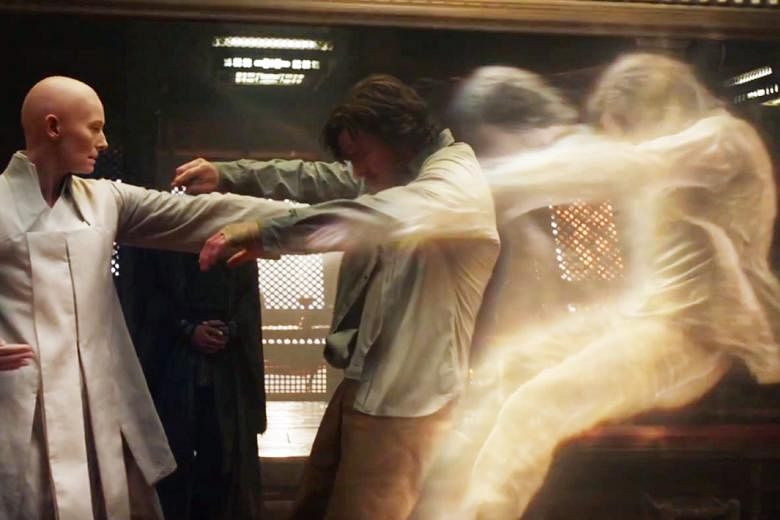Here's an understatement: It isn't easy being an Asian-American actor in Hollywood.
Despite some progress made on the small screen - thanks, Fresh Off The Boat! - a majority of roles that are offered to Asian- Americans are limited to stereotypes that wouldn't look out of place in a 1980s John Hughes comedy.
This problem is even worse when roles that originated as Asian characters end up going to white actors. Unfortunately, these casting decisions are not a relic of Hollywood's past, like Mickey Rooney's portrayal of I.Y. Yunioshi in Breakfast At Tiffany's, but continue right up to the present.
Last week, Disney and Marvel Studios released the trailer for Doctor Strange, an adaptation of the Marvel comic. After exhausting every "white man finds enlightenment in the Orient" trope in less than two minutes, the trailer presents Tilda Swinton as the Ancient One, a Tibetan male mystic in the comics. Though her casting was no secret, there was something unsettling about the sight of Swinton's clean-shaven head and "mystical" Asian garments. It recalled jarring memories of David Carradine from Kung Fu, the 1970s television series that, coincidentally, was itself a whitewashed version of a Bruce Lee concept.
A few days later, DreamWorks and Paramount provided a glimpse of Scarlett Johansson as the cyborg Motoko Kusanagi in their adaptation of the Japanese anime classic Ghost In The Shell. The image coincided with reports that producers considered using digital tools to make Johansson look more Asian - basically, yellow face for the digital age.
This one-two punch of white actors playing Asian characters showed how invisible Asian- Americans continue to be in Hollywood. (Not to be left out of the whitewashing news, Lionsgate also revealed the first images of Elizabeth Banks as Rita Repulsa, another originally Asian character, in its gritty Power Rangers reboot.)
Why is the erasure of Asians still an acceptable practice in Hollywood? It's not that people don't notice: Just last year, Emma Stone played a Chinese-Hawaiian character named Allison Ng in Cameron Crowe's critically derided Aloha. While that film incited similar outrage (and tepid box- office interest), no national conversation about racist casting policies took place.
Obviously, Asian-Americans are not the only victims of Hollywood's continuing penchant for whitewashing. Films such as Pan and The Lone Ranger featured white actors playing Native Americans, while Gods Of Egypt and Exodus: Gods And Kings continue the long tradition of Caucasians playing Egyptians.
In all these cases, the film-makers fall back on the same tired arguments. Often, they insist that movies with minorities in lead roles are gambles. When doing press for Exodus, the director Ridley Scott said: "I can't mount a film of this budget" and announce that "my lead actor is Mohammad so-and-so from such-and-such".
When the screenwriter Max Landis took to YouTube to explain the Ghost In The Shell casting, he used a similar argument. "There are no A-list female Asian celebrities right now on an international level," he said, admonishing viewers for "not understanding how the industry works".
Landis' argument closely tracks a statement by the screenwriter Aaron Sorkin. In a leaked e-mail exchange with studio heads, he complained about the difficulty of adapting Flash Boys, Michael Lewis' book about the Wall Street executive Bradley Katsuyama, because "there aren't any Asian movie stars".
Hollywood seems untroubled by these arguments. It's not about race, they say; the only colour they see is green: The reason Asian- American actors are not cast to front these films is because not any of them have a box-office track record.
But they're wrong. If minorities are box-office risks, what accounts for the success of the Fast And Furious franchise, which presented a broadly diverse team, behind and in front of the camera? Over seven movies, it has grossed nearly US$4 billion (S$5.4 billion) worldwide. In fact, a recent study by the Ralph J. Bunche Center for African American Studies at the University of California, Los Angeles, found that films with diverse leads not only resulted in higher box-office numbers but also higher returns of investment for studios and producers.
And Hollywood's argument is circular: If Asian-Americans - and other minority actors more broadly - are not even allowed to be in a movie, how can they build the necessary box office clout in the first place? To make matters worse, instead of trying to use their lofty positions in the industry to push for change, Hollywood players such as Landis and Sorkin take the easy, cynical path.
Even a modest hit such as the Harold and Kumar trilogy, starring John Cho and Kal Penn, was able to quadruple its production budget after box-office and home media sales. Meanwhile, films with white stars fail at the box office all the time. Chris Hemsworth, who stars in the Huntsman sequel, has had many more box-office flops than successes, yet he is considered a bankable movie star.
Such facts reveal Hollywood's dirty little secret. Economics has nothing to do with racist casting policies. Films in which the leads have been whitewashed have all failed mightily at the box office. Inserting white leads had no demonstrable effect on the numbers. So why is that still conventional thinking in Hollywood?
For years, audiences have essentially boycotted these films, yet studios keep making them. Let's hope Hollywood eventually listens.
NEW YORK TIMES
•Keith Chow is an editor of the Asian-American comics anthologies Secret Identities and Shattered.

